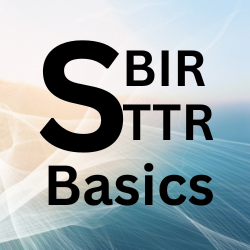Case Study:
NIH STTR Phase I and II Recipient Story
Company Name: BioTech Solutions, Inc. (BTSI)
Industry: Biotechnology
Funding Source: National Institutes of Health (NIH) – Small Business Technology Transfer (STTR) Phase I & II Awards
Research Institution: State University of Biomedical Sciences (SUSB)
CEO/President: Dr. John Doe, Ph.D. (Also a Professor at SUSB)
Background
What happens to a company that fails to follow the Small Business Technology Transfer program rules? What are the consequences of fraud, mismanagement, and ethical violations?
BioTech Solutions, Inc. is a small biotechnology company. It was awarded both NIH STTR Phase I and Phase II grants. The funding was to advance the development of a novel biomedical technology. These awards require small businesses to collaborate with academic institutions to transfer technology from research to commercialization, which is critical to fostering innovation.
Dr. John Doe, the CEO and President of BioTech Solutions, also holds a tenured faculty position at State University of Biomedical Sciences (SUSB). The business’s proposed project focused on researching and developing a new diagnostic device for early-stage cancer detection. As part of the award’s stipulations, the STTR program requires that the small business perform at least 30% of the research work and the remaining 70% by the academic institution.
The Issue: Work Allocation and Resource Mismanagement
Upon auditing, investigating, and reviewing BioTech Solutions’ use of the NIH STTR awards, NIH determined the company performed virtually none of the research work specified in the grant proposals. All research occurred in Dr. Doe’s university lab at SUSB, where he served as a principal investigator.
1. Lack of Work Performed by the Small Business
BioTech Solutions only managed administrative tasks, like invoicing and paying bills for subawards, Dr. Doe’s salary, materials, bookkeeping, and lawyers. It didn’t hire staff but employed university students and personnel. The company failed to invest in infrastructure, relying on university labs and equipment. This neglected the NIH STTR Phase I and II research goals. BioTech lacked a dedicated research team, with Dr. Doe’s university lab handling all experiments, data, and prototypes. It contributed minimally to commercialization, ignoring business strategies, partnerships, or regulatory plans. Dr. Doe, focused on academic duties, left commercial development underdeveloped.
2. Misuse of University Resources
Dr. Doe misused university resources for the NIH STTR project. He used university credit cards for research expenses, including equipment and consumables, which BioTech Solutions should have covered. These were misreported as university costs, violating regulations. The research used SUSB’s lab and equipment without BioTech Solutions providing its resources. This reliance on university infrastructure, at no cost, created an unauthorized in-kind contribution, misusing public and private funds.
3. Failure to Meet STTR Requirements
The NIH STTR program requires small businesses to perform a substantial portion of the work to qualify for funding. BioTech Solutions did not meet the required 30% contribution to the project and left all practical aspects of the research to the university.
- Phase I Grant: The primary goal of the Phase I grant was to establish the feasibility of the proposed technology. BioTech Solutions’ role was to manage this phase with its personnel and resources. However, the company did not produce any significant results or contribute to the work itself, leading to concerns about the integrity of the grant application.
- Phase II Grant: Phase II funding focused on developing and transitioning the technology to a commercially viable product. However, BioTech Solutions did not make the necessary progress toward commercialization, focusing instead on academia and laboratory work at SUSB.
4. Conflict of Interest and Ethical Violations
Dr. Doe’s dual roles as CEO of BioTech Solutions and professor/principal investigator at SUSB created a conflict of interest. The misallocation of university resources to BioTech Solutions raised ethical concerns about the misuse of public funds and the lack of proper oversight.
- Conflict of Interest: The overlap between Dr. Doe’s responsibilities at SUSB and BioTech Solutions posed an apparent conflict. NIH regulations mandate that individuals receiving grants from the agency avoid conflicts that may impair the objectivity or integrity of their work. In this case, Dr. Doe’s personal and professional issues led to a lack of oversight of the financial and scientific aspects of the project, as well as potential biases in research decisions and reporting.
- Failure to Report Misuse: Dr. Doe did not disclose the full extent of the use of university resources in his grant reports to NIH or the university, violating the grant’s reporting requirements and his employment contracts with SUSB and BTSI. NIH discovered the fraud when it conducted an audit using the Defense Contract Audit Agency (DCAA) to conduct a post-award audit of the Phase II.
Consequences and Investigations
In light of these issues, the NIH initiated an internal review of BioTech Solutions and its associated academic partner, SUSB. The investigation revealed the following:
Noncompliance with NIH Regulations:
BioTech Solutions breached the award terms and conditions. Failing to meet the 30% work contribution requirement and excessive reliance on university resources breached the NIH’s funding regulations. Doe’s deliberate falsification of reports, false claims in proposals and invoices, and numerous other concealed items constituted fraud against the government.
- Repayment of Funds: NIH demanded repayment of all the Phase I and II grant funds, plus fines and penalties totaling over $3.5 million.
- Debarment and Suspension</strong>: Dr. Doe and BTSI were debarred and suspended from participating in government-funded research programs.
- Academic Misconduct: SUSB was also scrutinized for its lack of oversight and failure to ensure that Dr. Doe’s dual roles did not create conflicts of interest or violate university policies. While the university was not directly penalized, it was required to implement stronger policies on faculty involvement in external businesses.
- Criminal and Civil Legal Actions: NIH and other parties filed criminal fraud charges against Dr. Doe. The university filed a Civil action against Dr. Doe and BTSI.
Lessons Learned
This case is a cautionary tale for other small businesses and academic institutions involved in NIH-funded collaborations. Several important lessons emerged:
- Clear Separation of Roles: Small businesses must separate their operations from academic institutions, especially when receiving government funding. Mixed roles, such as Dr. Doe’s dual positions, must be thoroughly monitored to avoid conflicts of interest.
- Proper Resource Allocation: Small businesses and academic institutions must establish clear rules and processes to manage and resolve conflicts of interest. They should also invest in their infrastructure and personnel to fulfill grant requirements.
- Transparency and Reporting: Grantees must be transparent about using funds and accurately report all expenditures. Misuse of funds or lack of disclosure can lead to serious consequences, including losing future funding opportunities.
- Oversight Mechanisms: Academic institutions must implement strict oversight mechanisms to ensure compliance with external business activities, particularly when faculty members are involved.
Conclusion
The BioTech Solutions case highlights the risks involved when small businesses fail to fulfill their obligations under government grants, especially in the context of STTR awards designed to encourage academic-business collaboration. In this case, the company’s failure to perform any research activity and improper use of university resources resulted in financial penalties and a loss of trust in both the company and the academic institution. Effective management, transparency, avoidance of conflicts of interest, and adherence to grant guidelines are crucial to ensuring the success and integrity of federally funded projects.
Legal Disclaimer
Case studies are for informational purposes only. The names, companies, and institutions used are fictional. Each case study illustrates potential risks, mismanagement, and legal considerations in the context of government funding programs. It does not represent legal or professional advice.
Readers should consult legal, financial, or other relevant professionals for advice regarding specific situations or concerns related to government funding, business operations, or compliance with federal regulations. The publisher(s) and author(s) disclaim any obligation for the completeness, accuracy, or usefulness of the information provided herein.
No individual or entity involved in the creation or distribution of this case study assumes liability for any damages or losses arising from the use of, or reliance on, this case study.

